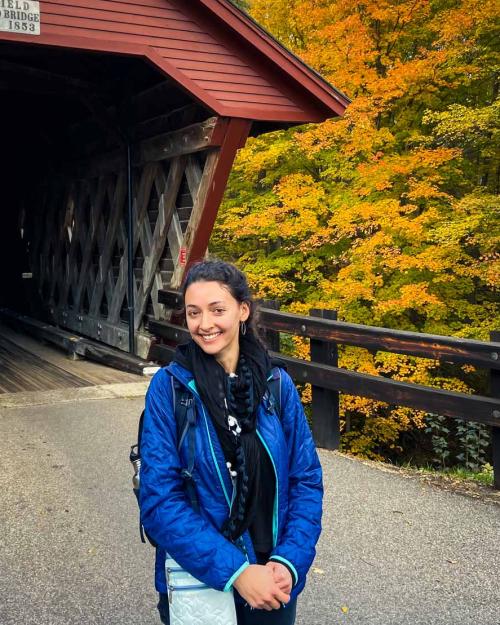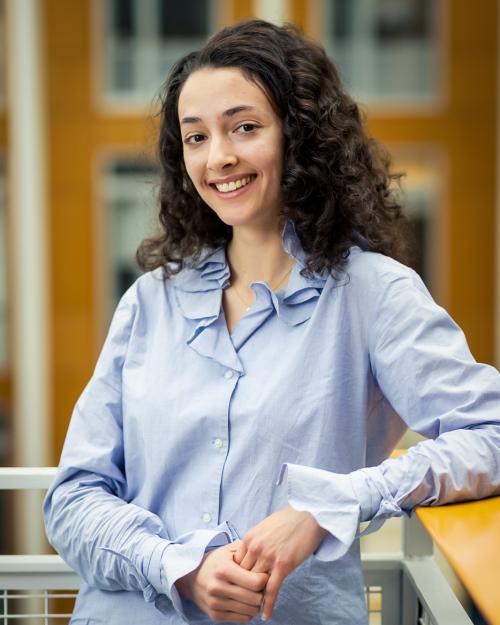Nola Rettenmaier
Biological Sciences
San Francisco, Calif.
What was your favorite class and why?
I’ve taken many memorable courses at Cornell, so this question is tricky to answer! But I will say CHEM 3600 (Honors Organic Chemistry II) and NES 2812 (Hieroglyphs to HTML: A History of Writing) stood out to me. I unexpectedly really enjoyed organic chemistry and the challenge of coming up with creative ways to solve problems. Hieroglyphs to HTML informed my current fascination with language and writing; I drew upon many of the concepts from that class for my project for the Humanities Scholars Program.
What have you accomplished as a Cornell student that you are most proud of, either inside the classroom or otherwise?
Through my involvement at the Specht Lab, I’ve completed a thesis for the biology honors program on a family of genes that play a role in floral organ fusion, focusing on their evolution and expression patterns in the order Zingiberales. For the Humanities Scholars Program, I completed a capstone project on modern art in the Arab world, specifically the Hurufiyya movement — characterized by the incorporation and recontextualization of Arabic letters into works of art. Additionally, I’ve co-authored papers as a member of the Hybrid Body Lab, where I’ve worked on projects integrating traditional crafting techniques (paper and textile weaving) with on-body technology. These projects are the culmination of the analytical and writing skills I’ve developed over the course of my time here, as well as my dual interests in the sciences and humanities, which I’ve had the opportunity to cultivate through my A&S coursework and research pursuits. As a senior, synthesizing my interests through these projects has been a very meaningful and rewarding experience. From freshman to junior year, I worked at Cornell Botanic Gardens as part of their Learning by Leading program, where I worked with a team of students and gardens staff to develop public engagement programming. As one of two student co-leads for the first Learning by Leading (LxL) cohort at the gardens, I helped develop the LxL program, which is now thriving and has grown from one to multiple student-led teams. I remain very proud of having created public engagement programs for Cornell Botanic Gardens and for having played a role in the development of the LxL program.
How have your beliefs or perspectives changed since you first arrived at Cornell?
I’ve been able to cultivate a love of film through Cornell Cinema, I’ve participated in honey extractions at the Dyce Bee Lab and I’ve discovered the hidden gem that is Cornell’s Center for Historical Keyboards. I’ve taken a class on scientific illustration of birds through the Lab of Ornithology, written for the Cornell Book Review and completed a creative writing project for a course on the Underground Railroad (taught by Professor Gerard Aching). Through these experiences I’ve discovered facets of myself I didn’t know before, and my perspective on life at Cornell has expanded to include these eclectic and memorable aspects of my years here.
If you were to offer advice to an incoming first year student, what would you say?
It can be intimidating to approach a professor at the end of lecture to clarify a concept, but you should never hesitate to ask for help. Taking the initiative to engage with the material especially when difficult, and asking questions, are crucial to your academic success at Cornell. Also, always be sure to have at least one class in your schedule that you are genuinely excited about — perhaps it’s outside of your major, or you’ve been interested in the topic and want to explore it further, or it’s something fun and stress-busting. Balance is incredibly important.
Every year, our faculty nominate graduating Arts & Sciences students to be featured as part of our Extraordinary Journeys series. Read more about the Class of 2023.






